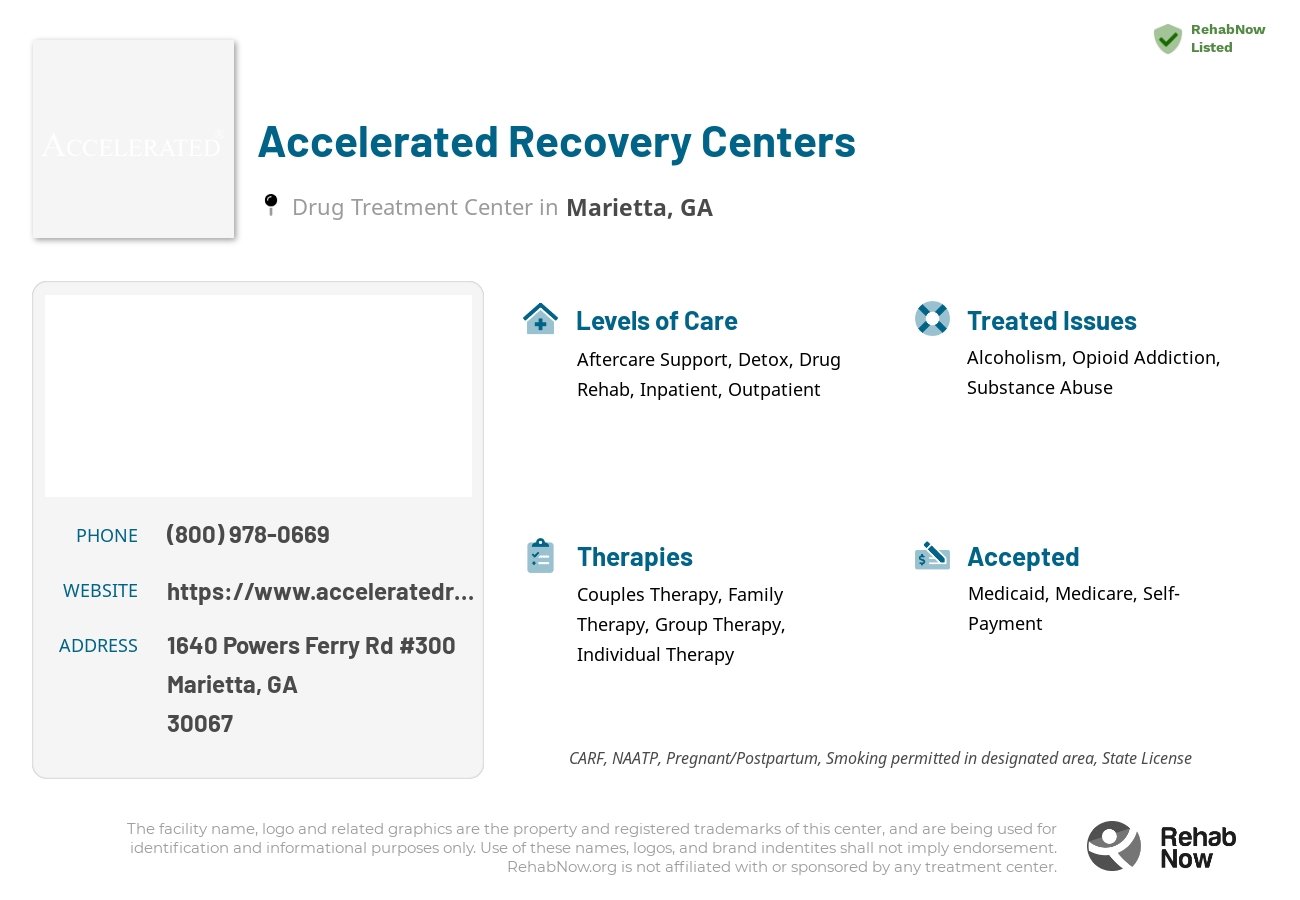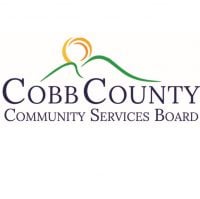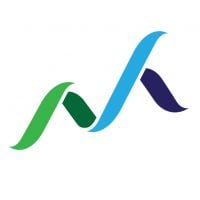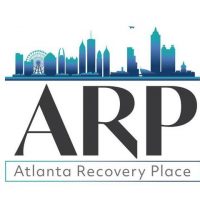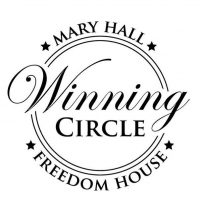About This Georgia Facility
Accelerated Recovery Centers in Marietta, Georgia is a treatment facility dedicated to helping individuals struggling with alcoholism, opioid addiction, substance abuse, drug addiction, and mental health issues. The center offers various levels of care to cater to the unique needs and preferences of their patients. These levels of care include aftercare support, detoxification services, inpatient treatment, outpatient programs, and drug rehabilitation. Located in Marietta, the facility provides a comfortable and supportive environment where individuals can find the necessary help to begin their journey towards sobriety and improved mental health.
Accelerated Recovery Centers provides a comprehensive range of services and treatment methods to address addiction and substance abuse. Their aftercare support programs aim to assist individuals in transitioning back into their everyday lives after completing treatment. The center also offers detoxification services for those who need assistance in safely managing withdrawal symptoms. Additionally, they provide inpatient and outpatient treatment programs, allowing patients to choose the intensity and duration of their treatment based on their specific needs. Utilizing evidence-based approaches, such as cognitive-behavioral therapy and individual counseling, Accelerated Recovery Centers ensures that individuals receive personalized care and support throughout their recovery process.
Genders
Ages
Modality
Additional
Conditions and Issues Treated
Substance Abuse Treatment is important when getting sober, as it helps addicts learn the skills they need to live a clean life. There are many different kinds of recovery treatment, including medication-assisted therapy, behavioral therapeutic approaches and self-help groups, as well as counseling.
Opioid abuse has become a national epidemic in the last decade. The US has one of the world’s highest rates of opioid use and abuse, as well as opioid-related deaths. Opioids are classified as Schedule II-IV controlled substances in the US due to their high potential for abuse.
Oxycodone, hydrocodone, methadone, and fentanyl are the most common Opioids and are commonly prescribed to treat pain. Tolerance to opioids develops over time, making life difficult, if not impossible, without them. Opioid users often obtain the drugs illegally. They can be drug dealers, friends, or family members who do not have valid prescriptions.
The desire for a more intense high than prescription opioids can quickly lead to heroin use. Heroin users are more prone to illness and death due to the high risk of overdose.
Many opioid addicts who seek treatment believe that the only way to overcome their addiction is through medical detox and long-term drug addiction rehab. To help patients wean off their addiction and reduce the risk of overdose, medication-assisted therapy (MAT) involves prescribing a replacement opioid. Doctors use MAT in conjunction with other anti-craving medications to help patients maintain recovery. Due to the high risk of relapse, MAT is often combined with individual and group counseling and social support programs.
Levels of Care Offered at Accelerated Recovery Centers
This center offers a variety of custom treatment tailored to individual recovery. Currently available are Aftercare Support, Detox, Drug Rehab, Inpatient, Outpatient, with additional therapies available as listed below.
The detoxification process typically includes some combination of the following: medical supervision, medication to help alleviate withdrawal symptoms, drug testing to monitor progress, and counseling.
Tackling the physical symptoms of withdrawal is essential to ensure that an individual can focus on the psychological aspects of the addiction without focusing on the physical pain that comes with withdrawal.
Withdrawal symptoms can be uncomfortable, even life-threatening, so carefully managing the detox process is extremely important. In many cases, more advanced pharmaceutical interventions are used to treat more severe withdrawal symptoms. Medication might help alleviate discomfort associated with detox, including nausea and headaches.
Inpatient treatment centers offer a safe, secure, and often medically supervised environment for drug or alcohol-addicted individuals. Many of these facilities are equipped to provide detoxification, treatment for co-occurring mental health disorders, and aftercare programs. The patient typically spends 28 to 30 days at the facility and will receive extensive drug counseling.
An outpatient treatment program is set up to help with alcohol or drug addiction or a co-occurring disorder. The patient must attend the facility for their therapy and other programs but can return home each night.
The frequency of mandatory attendance decreases after much of Accelerated Recovery Centers‘s program is complete.
Outpatient treatment is a recovery approach that allows recovering addicts to live at home while getting rehab for addiction
An outpatient can include day treatments which include attending group sessions one hour per week. A person living in an outpatient environment may be allowed the opportunity to work full time if they choose to and continue studies without interruption from drugs/alcohol.
Outpatient treatment is an option for people who want to maintain their careers and families. Outpatients live at home but attend treatment such as individual counseling, group counseling, or twelve-step meetings during the day.
Aftercare support is vital to the success of someone in drug or alcohol treatment. It involves assisting with entering a sober living home, getting career counseling or educational assistance and even getting the individual lined up with programs like AA and NA. This support helps recovering addicts readjust to normal day-to-day activities and maintain sobriety.
When a person is in drug or alcohol treatment, they have to increase their focus on themselves. They need to learn how to recognize the triggers that cause them to relapse and learn the habits that would benefit them if they were to be sober. This is all part of the growth in recovery, and aftercare is essential to that process.
Therapies & Programs
At Accelerated Recovery Centers , to learn from past mistakes and improve one’s situation, the recovering person meets individually with a therapist. The counselor or therapist will address addiction causes, triggers, mental issues, dual diagnosis, and aftercare plans during this time. This is a very intense and challenging process. Some clients find it easier to open up to someone other than family or friends who understand their struggles with addiction.
Couples therapy sessions are typically used to help couples in recovery from drug addiction work through their issues. These types of sessions can be beneficial for many reasons, including the fact that they add a layer of accountability when both partners in a couple are recovering from addiction.
Therapy can also provide addicts with another effective way to cope with stress and avoid relapse during difficult situations. This type of therapy can help improve communication with their partners, which can strengthen the relationship and prevent future problems that might lead to relapse.
Family therapy is a crucial part of drug treatment and getting sober. It is one of the most effective ways to help addicts stay on the path to long-term sobriety. An addict’s family can play a vital part in helping them to avoid relapse. They can spot the warning signs and help them get back on track.
In group therapy, recovering addicts meet with a therapist and other people in recovery. Some groups are closed, meaning only people who share the same addiction or problem can attend. Others are open to anyone who wants to stop using drugs or drinking alcohol. Group therapy sessions typically focus on one topic each week or month so that recovering addicts can discuss issues they face daily.
The 12-step program is designed for people who suffer from addiction. It helps addicts to recover and live a normal life. This program is used in almost all substance abuse treatments. The 12 steps include:
- Admitting the problem.
- Focusing on the recovery process.
- Making amends with others.
- Believing in a higher power.
In this program, peers help each other to achieve the goal of abstinence. The founders of Alcoholics anonymous initially developed the 12-step program. According to its successful results, it is used as a part of other substance abuse treatments. The program provides cognitive restructuring to an individual to change negative thoughts, which leads to long-term benefits.
Payment Options Accepted
For specific insurance or payment methods please contact us.
Additional Details
Specifics, location, and helpful extra information.
Marietta, Georgia 30067 Phone Number(800) 978-0669 Meta DetailsUpdated November 25, 2023
Staff Verified
Patient Reviews
There are no reviews yet. Be the first one to write one.
Marietta, Georgia Addiction Information
Prescription opioid use has caused a large increase in the total amount of overdoses in Georgia. Almost 12% of the Georgia population uses illicit drugs each year, and slightly over 3.5% also abuses alcohol at the same time. This does not include those who binge-drink at least once a month, which includes 20% of all Georgians.
The drug addiction problem in Marietta, GA, is relatively inadequate. Approximately 9% of Marietta abuse drugs. 4,000 deaths per year are attributed to drug overdoses. Overdose rates for opioids increased by more than 500% between 1999 and 2016. Some of the most common rehab facilities include inpatient rehabs, outpatient rehabs, and 12-step programs. Each option has its pros and cons that should be considered when searching for the best treatment.
Treatment in Nearby Cities
- Dahlonega, GA (50.5 mi.)
- Flowery Branch, GA (36.2 mi.)
- Ball Ground, GA (29.7 mi.)
- Stapleton, GA (124.9 mi.)
- Dublin, GA (131.1 mi.)
Centers near Accelerated Recovery Centers
The facility name, logo and brand are the property and registered trademarks of Accelerated Recovery Centers, and are being used for identification and informational purposes only. Use of these names, logos and brands shall not imply endorsement. RehabNow.org is not affiliated with or sponsored by Accelerated Recovery Centers.

